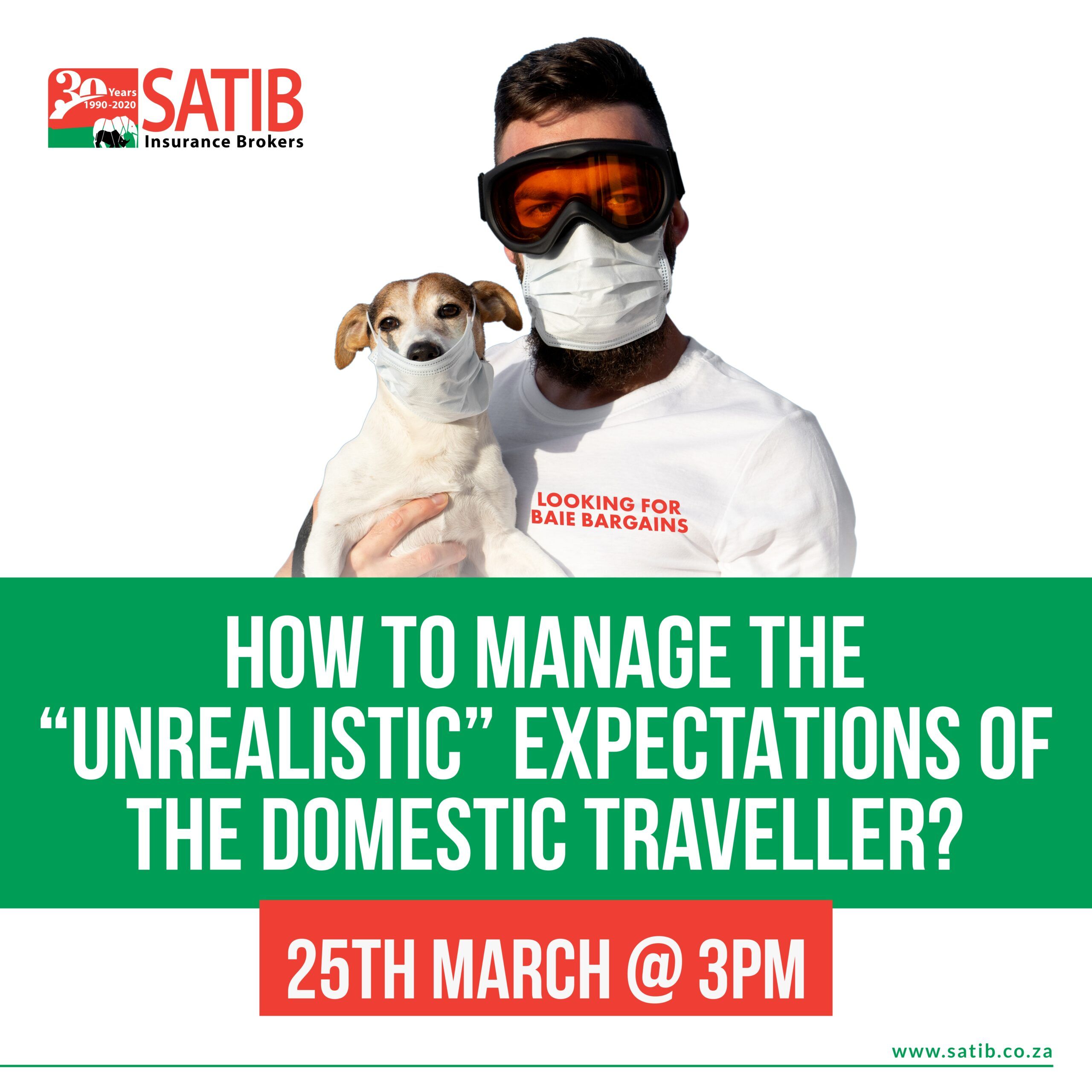In our latest webinar, panellists Amy Knight-Dawson (Scribe Consulting), Don Scott (Tanda Tula) and Stacey Rowe (SATIB Branch Manager) joined Natalia Rosa (Big Ambitions) in conversation about South Africa’s domestic tourism market.
Specifically, how different is the domestic tourism market? What do establishments and operators need to keep in mind when they ‘pivot’ to a domestic audience? What are the risks involved when it comes to discounting your rates – and what other obstacles will you face?
For Don Scott and Tanda Tula (whose virtual Sofa Safaris kept their team busy – and audiences enthralled – during lockdown) the biggest challenge was deciding on a rate for domestic guests (not to mention concerns around how the notion of dual rates would be received overseas). On the whole though, it’s been a positive experience for the lodge and Don sees plenty of opportunity in the future.
Both Amy Knight-Dawson and Stacey Rowe agree, done right – and with the expectation of a ‘slow burn’ rather than a ‘quick fix’ – the domestic market has plenty to offer.
Here are just some of the points they touched on:
How do you decide on a rate for the local market?
Whether you’re a 5-star safari lodge or a boutique hotel, B&B or backpacker, the first thing you need to do is establish who your audience is. There is segmentation in every market, and you can never be affordable for everyone.
“Understand where you fit,” says Don. “The first thing we wanted to understand was what people were willing to pay for a local holiday. In other words, what people were willing to pay for their break – and not be stressed out by it. We settled on a comfortable rate. It’s better than not earning anything and it’s opened us up to a new, loyal market.”
Do some research, establish what other players are doing, chat to local operators and price yourself for your market segment.
How different is a South African audience?
For Don, the biggest difference is that South Africans are used to self-drive holidays where they do their own thing: “We did wonder if – and how – we were going to get people interested in our offering, which is very different to the self-drive Kruger Park experience. But we were surprised, in a good way, about the uptake.”
Amy believes that South Africans love value, last-minute trips and flexibility, meaning both operators and establishments must be prepared to ‘yield’:
“Local travellers like to be in the driving seat. Make packages attractive to the SA traveller, for example, consider offering great value-added packages in winter for a little more.”
Yes, they’re price conscious and value-driven, but the South African market is also loyal.
“If your offering or experience is something that people connect to,” says Don, “They become very, very loyal. And South Africans talk to their friends.”
How do you manage the expectations and quirks of the domestic market?
Communicate, communicate, communicate. Don believes that once you identify who your audience is you can target your comms to your market – and then educate them around exactly what to expect before they arrive. “That’s how you manage expectations,” says Don, “And in fact, you’ll exceed expectations.”
A good example is that Tanda Tula’s domestic rates are not all-inclusive. While their international rates include all beverages, it’s simply not viable for a local audience.
“While you will still get complimentary teas and coffees and the odd G&T on a game drive,” explains Don, “We can no longer offer an all-inclusive package. But it’s all about managing expectations. As long as it is communicated clearly to guests, it is not a problem.”
If I no longer have international guests, do I still need all the insurance/the same insurance I had previously?
Unfortunately, according to Stacey, very little changes from a risk perspective – in fact, you need your insurances now more than ever!
“As a result of the economic downturn caused by the pandemic, we’re actually seeing an increase in property crime, civil unrest, theft of contents, bilking, fraudulent use of credit cards and the like,” explains Stacey. “If anything, the surge in theft-related claims has not only highlighted why it’s imperative that you keep your insurances in place, but that you place your insurance through a specialist broker or insurer that understands the risks you are faced with.”
Importantly, if you have diversified your offering you need to speak to your broker to ensure that any ‘new risks’ are covered. For example, you may have started offering shuttles for the first time, are organising events or even serving food – and you’ll need appropriate cover.
“Many of our clients have diversified their offering in order to remain relevant and find creative ways to generate income,” says Stacey, “And while we applaud that, General Public Liability premiums are generally rated on your risk profile, so you’ll need to notify your broker accordingly to ensure that your cover is not compromised in any way.”
But on the flipside, a change in services or offering could also reduce your premiums, especially if you are no longer offering shuttles, or transporting clients across borders.
What should we be doing differently at the moment? And is it possible to cut costs while appealing to a new, local market?
For Amy, partnerships are key to recovery.
“Look at your product and forge strong partnerships with local agents, operators and partners in the industry. You’ll be surprised how flexible agents and operators can be, there is definitely less wiggle room in the local market, but opportunities are still there. Eke out your niche and cement relationships.”
Many operators have also ‘pivoted’ and are now doing completely different things. There are new opportunities, so look who you can partner with,” says Amy.
For Stacey, your insurance broker is also an important partner: “We completely understand the financial burden of those in the industry, we’re facing it too. Reach out to your broker and chat to them about how best to restructure your policy in such a way that you keep as many covers in place as possible, but reduce your premium spend significantly.”
As for doing things differently, the panel had the following tips:
- Keep things simple.
Less is more. There is so much happening at the moment that you really want to keep things simple and memorable. And make sure that you can facilitate easy transactions.
- Have an offer on long enough for agents and the trade to market it.
Avoid a massive flurry of offers. There is too much in the mix, so avoid confusion at all costs and give the trade the time they need to market your special.
- Leverage your contacts.
Earmark your contacts and keep in close contact with them re. any offers.
- Be brave enough to try new things.
From automation and dedicated log-ins on your website for local operators (so the international market can’t see your domestic rates) to dynamic discounting (rates are live) a domestic audience is ripe for a new approach.
- Investigate your purpose and understand your why.
According to Amy, you need to decide upfront whether you want to dip your toe in the domestic pool – or dive right in and commit to it.
And did Tanda Tula’s pricing cause ripples in the international market? You’ll need to watch the webinar to find out.
Catch the full conversation in the video below.



